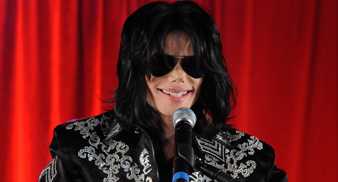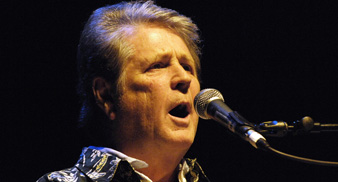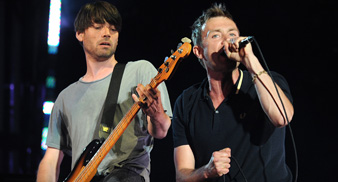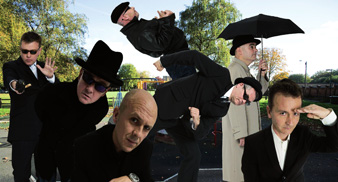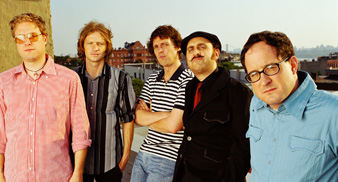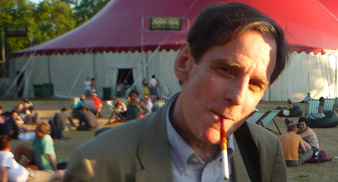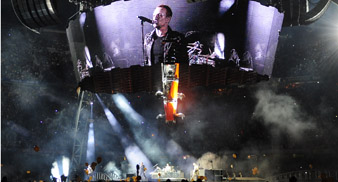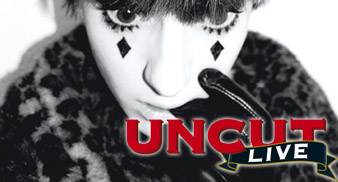"It was too big," says one old local shopkeeper of the festival that turned his town upside down in August 1969. "Too big for this world…" The question now is: is Woodstock still too big for the world to comprehend and contextualise? It remains the defining assembly of rock's half-century lifespan, an unprecedented gathering of at least 300,000 young, longhaired, raggedly-clad Americans "going up the country" in New York's Catskill's mountains, searching for answers, hoping for transcendence… and finding what, exactly? The most famous song about Woodstock was, of course, written by someone who wasn't there. So were the 300,000 "stardust" and "golden", in sister Joni's lovely phrase, or were they exhausted, hallucinating inhabitants of a middle-class disaster zone? Watching Michael Wadleigh's 1970 documentary – here in a 4-DVD, 2-Blue-Ray set comprising the original film with two hours of new footage – will probably have you concluding that the truth lies somewhere in between (unless of course you were there, with your own unreliable memories to share). There is much euphoria and jubilation on offer– and sundry musical delights – but there are also telling echoes of footage from the Vietnam war: helicopters and medical tents, young men looking dazed and confused, the muddy chaos of it all. And of course Vietnam hangs over the event like a shroud, infusing everything from the mess call that follows Wavy Gravy's famous breakfast invitation to Jimi Hendrix's ceremony-closing deconstruction of "The Star-Spangled Banner". One of the most significant interviews in the whole film is with the jovial Port-a-loo guy who has one son in 'Nam and the other at the festival itself. Coming two years after Monterey Pop signaled that rock was destined to be a big open-air business, Woodstock is still "the big one", even if 1973's Watkins Glen drew significantly more people to upstate New York and on the strength of just three bands (the Band, the Grateful Dead, and the Allman Brothers). Woodstock is where the overheated rhetoric and psychoactive disturbance of the 1960s hits fever pitch, with Altamont as its wretched aftermath just four months later. Early intimations of the hoards descending on O Little Town Of Bethel have the ever-unsentimental Bill Graham opining that "there must be some way of stopping this influx of humanity". Of course, no one – not Graham, not babyfaced impresario Michael Lang or his overawed partner Artie Kornfeld – was able to do that, and the children of the revolution poured in from all over America, broke down the pathetic chain fencing, and stretched the festival's facilities to breaking point. "It looks like some biblical, epical, unbelievable scene," says Jerry Garcia, stringing his guitar before Richie Havens has even been led out – like some African chieftain to be sacrificed – to get things rolling. Garcia's Grateful Dead are just one of the acts whose Woodstock appearance we finally get to see on this splendid new set. Unfortunately for Deadheads the band is represented mainly by an interminable "Turn On Your Lovelight" with Garcia (black-bearded and black-T-shirted, with a black Gibson SG) all but invisible in the darkness. The new HD footage does, however, permit you to view Leslie West's sweat and Pete Townshend's glistening conk up close and personal. More incidental pleasures include Hendrix grinning incredulously in the wings as he watches '50s revivalists Sha Na Na – the festival's real freaks, methinks – performing Mark Dinning's timelessly kitsch "Teen Angel". The original film, edited and assistant-directed by Martin Scorsese, stands up well after all this time. The split-screen diptych and triptych montages – like the constant punctuation of the music by everything happening at the festival's edges – replicates the fragmentary experience of actually being at rock festivals before they all became user-friendly Glasto knockoffs. From a traumatized girl weeping that "I have to get out of here" to a crusty local farmer proclaiming "in plain English" that the whole debacle is "a shitty mess", Wadleigh's and Scorsese's focus is above all on the disoriented faux-tribalism of the event. Then again, the question never really gets answered. As "the ripped army of mud people" (a phrase of Robbie Robertson's) disperses, leaving Max Yasgur's farm looking like something like Nagasaki, there's no clear sense of what the festival meant. "Drugs and revolution, now it's all a little contrived," says one of the less fried hippie kids interviewed for the film. "People are really looking for some kind of answer when there isn't one… [They're] very lost." The peak musical moments are still the same: Havens' intense "Freedom"; tie-dyed Joe Cocker's spasticus-autisticus frenzy on the Grease-Band-backed "With a Little Help from My Friends"; the harmonies of Crosby, Stills & Nash, more lustrous than ever with the improved 5.1 audio; Santana's thrilling "Soul Sacrifice"; the pimpadelic Sly Stone, bathed in purple haze and taking the hippies higher; Janis Joplin giving her bloodcurdling all; and of course Jimi. "This is really a mind-fucker of all times," says John Sebastian as he prepares to sing for the biggest audience of his life. You can take that phrase any way you choose to. Extras:4* Two hours of new HD footage of performance by hitherto unincluded artists the Grateful Dead, Creedence Clearwater Revival, Paul Butterfield, Johnny Winter, and Mountain, plus new material by Joan Baez, Country Joe & the Fish (and Country Joe solo), Santana, The Who, and Jefferson Airplane. Plus The '60s and the Woodstock Generation, a new 50-minute documentary about the film's making. BARNEY HOSKYNS
“It was too big,” says one old local shopkeeper of the festival that turned his town upside down in August 1969. “Too big for this world…”
The question now is: is Woodstock still too big for the world to comprehend and contextualise? It remains the defining assembly of rock’s half-century lifespan, an unprecedented gathering of at least 300,000 young, longhaired, raggedly-clad Americans “going up the country” in New York’s Catskill’s mountains, searching for answers, hoping for transcendence… and finding what, exactly?
The most famous song about Woodstock was, of course, written by someone who wasn’t there. So were the 300,000 “stardust” and “golden”, in sister Joni’s lovely phrase, or were they exhausted, hallucinating inhabitants of a middle-class disaster zone? Watching Michael Wadleigh‘s 1970 documentary – here in a 4-DVD, 2-Blue-Ray set comprising the original film with two hours of new footage – will probably have you concluding that the truth lies somewhere in between (unless of course you were there, with your own unreliable memories to share).
There is much euphoria and jubilation on offer– and sundry musical delights – but there are also telling echoes of footage from the Vietnam war: helicopters and medical tents, young men looking dazed and confused, the muddy chaos of it all. And of course Vietnam hangs over the event like a shroud, infusing everything from the mess call that follows Wavy Gravy‘s famous breakfast invitation to Jimi Hendrix‘s ceremony-closing deconstruction of “The Star-Spangled Banner”. One of the most significant interviews in the whole film is with the jovial Port-a-loo guy who has one son in ‘Nam and the other at the festival itself.
Coming two years after Monterey Pop signaled that rock was destined to be a big open-air business, Woodstock is still “the big one”, even if 1973’s Watkins Glen drew significantly more people to upstate New York and on the strength of just three bands (the Band, the Grateful Dead, and the Allman Brothers). Woodstock is where the overheated rhetoric and psychoactive disturbance of the 1960s hits fever pitch, with Altamont as its wretched aftermath just four months later.
Early intimations of the hoards descending on O Little Town Of Bethel have the ever-unsentimental Bill Graham opining that “there must be some way of stopping this influx of humanity”. Of course, no one – not Graham, not babyfaced impresario Michael Lang or his overawed partner Artie Kornfeld – was able to do that, and the children of the revolution poured in from all over America, broke down the pathetic chain fencing, and stretched the festival’s facilities to breaking point. “It looks like some biblical, epical, unbelievable scene,” says Jerry Garcia, stringing his guitar before Richie Havens has even been led out – like some African chieftain to be sacrificed – to get things rolling.
Garcia’s Grateful Dead are just one of the acts whose Woodstock appearance we finally get to see on this splendid new set. Unfortunately for Deadheads the band is represented mainly by an interminable “Turn On Your Lovelight” with Garcia (black-bearded and black-T-shirted, with a black Gibson SG) all but invisible in the darkness. The new HD footage does, however, permit you to view Leslie West‘s sweat and Pete Townshend‘s glistening conk up close and personal. More incidental pleasures include Hendrix grinning incredulously in the wings as he watches ’50s revivalists Sha Na Na – the festival’s real freaks, methinks – performing Mark Dinning’s timelessly kitsch “Teen Angel”.
The original film, edited and assistant-directed by Martin Scorsese, stands up well after all this time. The split-screen diptych and triptych montages – like the constant punctuation of the music by everything happening at the festival’s edges – replicates the fragmentary experience of actually being at rock festivals before they all became user-friendly Glasto knockoffs. From a traumatized girl weeping that “I have to get out of here” to a crusty local farmer proclaiming “in plain English” that the whole debacle is “a shitty mess”, Wadleigh’s and Scorsese’s focus is above all on the disoriented faux-tribalism of the event.
Then again, the question never really gets answered. As “the ripped army of mud people” (a phrase of Robbie Robertson’s) disperses, leaving Max Yasgur’s farm looking like something like Nagasaki, there’s no clear sense of what the festival meant. “Drugs and revolution, now it’s all a little contrived,” says one of the less fried hippie kids interviewed for the film. “People are really looking for some kind of answer when there isn’t one… [They’re] very lost.”
The peak musical moments are still the same: Havens‘ intense “Freedom”; tie-dyed Joe Cocker‘s spasticus-autisticus frenzy on the Grease-Band-backed “With a Little Help from My Friends”; the harmonies of Crosby, Stills & Nash, more lustrous than ever with the improved 5.1 audio; Santana‘s thrilling “Soul Sacrifice”; the pimpadelic Sly Stone, bathed in purple haze and taking the hippies higher; Janis Joplin giving her bloodcurdling all; and of course Jimi.
“This is really a mind-fucker of all times,” says John Sebastian as he prepares to sing for the biggest audience of his life. You can take that phrase any way you choose to.
Extras:4* Two hours of new HD footage of performance by hitherto unincluded artists the Grateful Dead, Creedence Clearwater Revival, Paul Butterfield, Johnny Winter, and Mountain, plus new material by Joan Baez, Country Joe & the Fish (and Country Joe solo), Santana, The Who, and Jefferson Airplane. Plus The ’60s and the Woodstock Generation, a new 50-minute documentary about the film’s making.
BARNEY HOSKYNS


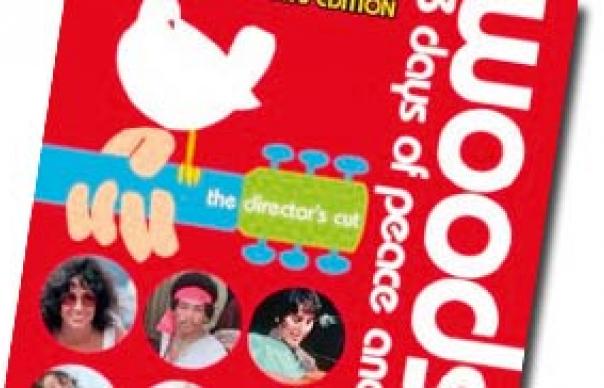
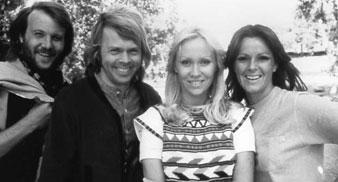
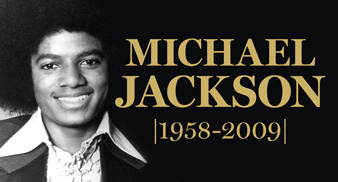
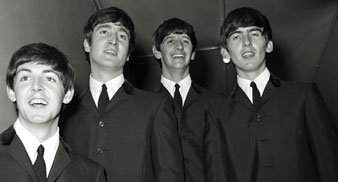
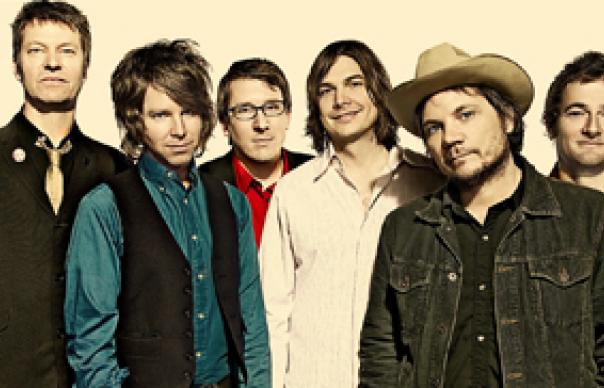
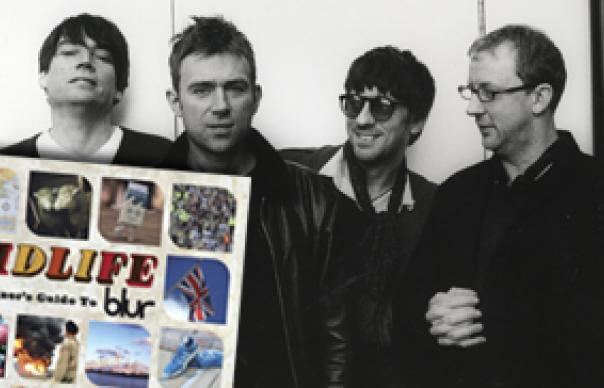
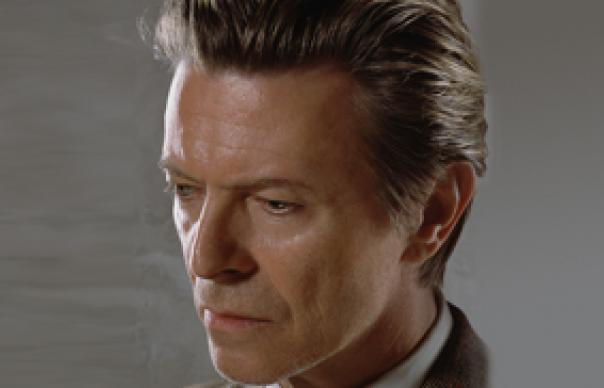
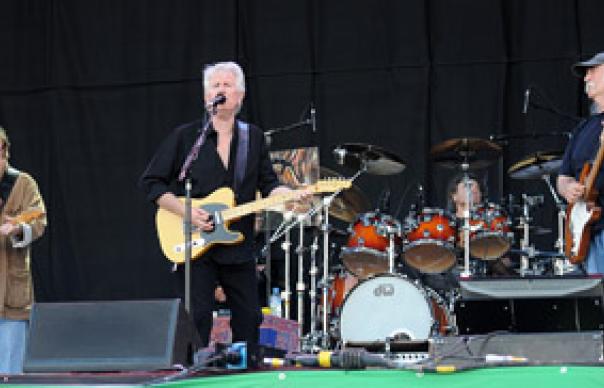
 Well, tonight we have what you might call EveryBlur. By which I mean, they cover all bases. Here’s a band conspicuously at peace with themselves and with their back catalogue. As guitarist Graham Coxon flagged up in the NME last December, “I always think there are two routes to Blur. The high street route and this other route round the back.” So, of course we’d get “Girls And Boys” and of course we’d get “Trimm Trabb”. Both equally, incontrovertibly, Blur. And both, in their radically different ways, equally brilliant.
The crowd in Hyde Park, sweltering in the hottest day of the year, resembles a Hackney flashmob, all skinny t-shirts and angular haircuts. They’re very young, too. One 16 year-old French student, who’s come over for the show, tells me he was “11 when Blur last played Reading Festival” and wants to hear “everything”. In the crowd, I spot, separately, Nigel Planer and Nikki from Big Brother. One girl has written in blue chalk up her right arm “Hooligan” and “Gorilla” on her left, lyrics from “On Your Own”. There’s a palpable air of excitement and energy that, mixed with the heat and alcohol, threatens to drift into something slightly more dangerous. We are, inevitably, a far cry from the crowd who were here for Neil Young or
Well, tonight we have what you might call EveryBlur. By which I mean, they cover all bases. Here’s a band conspicuously at peace with themselves and with their back catalogue. As guitarist Graham Coxon flagged up in the NME last December, “I always think there are two routes to Blur. The high street route and this other route round the back.” So, of course we’d get “Girls And Boys” and of course we’d get “Trimm Trabb”. Both equally, incontrovertibly, Blur. And both, in their radically different ways, equally brilliant.
The crowd in Hyde Park, sweltering in the hottest day of the year, resembles a Hackney flashmob, all skinny t-shirts and angular haircuts. They’re very young, too. One 16 year-old French student, who’s come over for the show, tells me he was “11 when Blur last played Reading Festival” and wants to hear “everything”. In the crowd, I spot, separately, Nigel Planer and Nikki from Big Brother. One girl has written in blue chalk up her right arm “Hooligan” and “Gorilla” on her left, lyrics from “On Your Own”. There’s a palpable air of excitement and energy that, mixed with the heat and alcohol, threatens to drift into something slightly more dangerous. We are, inevitably, a far cry from the crowd who were here for Neil Young or 